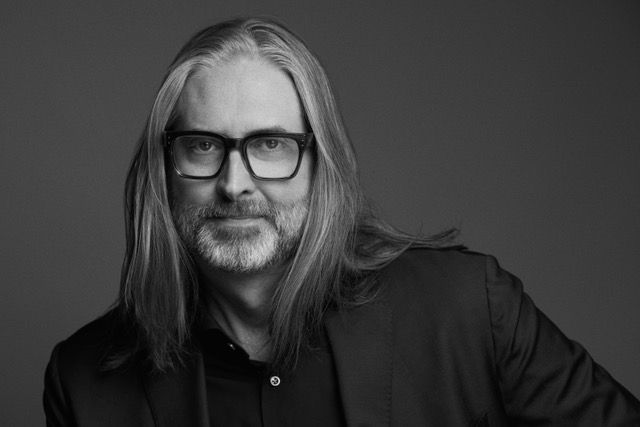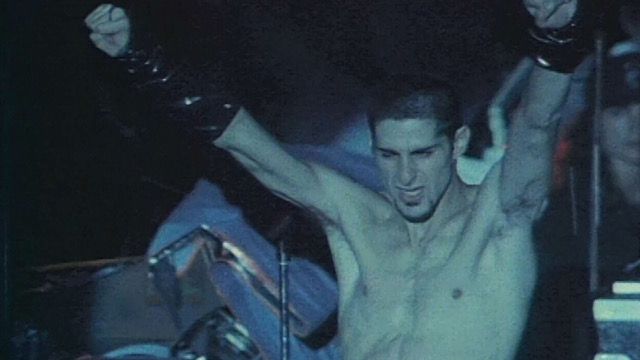
Full Circle: From Lollapalooza to Lolla—Director Michael John Warren
Michael John Warren is an artist. Everything about him screams it—but he’s also a consummate professional; a juxtaposition that feels a little odd, but honestly, in Hollywood, is kinda necessary. Nearly every writer, director, actor, make-up artist, set designer (and the list goes on!) starts as an artist before they realize you really have to be a businessperson. Where was someone to tell us we needed that degree to succeed?
It’s called show business, after all.
But back to Warren, this man has figured out how to walk that fine line, and done it well. He’s the kind of person you want to listen to for an hour because isn’t it great when filmmakers are excited about what they’ve made? You can feel it when you watch their work, and how they are just that little bit more animated when they talk about it after.
In Warren’s case, it’s the recent debut of Lolla: The Story of Lollapalooza at Sundance.
“It was really fun,” he smiles broadly, clearly flashing back to just this past January when the team debuted the story-driven documentary which will be hitting Paramount+ later this spring.
“It's kind of a special thing to be a director specifically at Sundance. It was really beautiful because you're treated with a lot of respect and a lot of kindness, and Robert Redford created that festival to create a shelter for artists who really wanted to grow their storytelling chops. It's really cool to experience that and to be in sort of this rarefied air. I've been doing this for a while now, but we opened the festival Thursday night I think it was, to like, a 1,300 person theater. I gave a kind of a fiery speech to kick the whole thing off and after, all these kids came up to me and they were so excited! To me they were young, like Gen Z, and they were so moved by what the film was about (there's three episodes of this series). And they were like, ‘Wow, you guys were really going through a lot of the same stuff we’re going through. Clarence Thomas being one, the Supreme Court, the environment, abortion rights, gun rights’— major touchpoints in the early-mid ‘90s. I said to them, I hope you guys can learn from what we did right and what we did wrong and find your own path, because we really need you guys to have a great run here. Because there are a lot of these things that have not gone very well since we were your age,” he laughs, a little sadly.
That’s the beauty of art though; its inherent reflection of reality. Especially in the documentary film space where Warren works so often and has perfected that reflection, thanks to a lengthy background in editing. A start to his career that has helped his director’s eye—and the Lolla fans at Sundance certainly appreciated it.
“After that premiere, I couldn't walk down Main Street in Park City without getting stopped by people in the street, which has never happened to me. No one knows who I am. But there, I was fake famous for like four days in a really small town in Utah. And that was kind of fun! Signing autographs, meeting kids who were super excited. It was a blast, really, a special thing for me to experience,” Warren admits, who got into musical docs by way of editing. And while this Emmy-nominated director has been around the world, on all continents except for Antarctica, this experience at Sundance will undoubtedly go down as a favorite.
“I've done a lot of music. I've done a lot of these docs in my life in a bunch of different lanes, like big concert films, intimate documentaries, and I told my agents, I don't know if I want to do music docs right now. And they said that's fine, but we just got off the phone with someone and I'm gonna say one word to you and you're gonna say yes or no: Lollapalooza. And I said yes. I was at the first-ever Lollapalooza in 1991. I was 17 years old, and I hadn't seen the world yet. I was raised in suburbia, and it was a really, really shocking day for me in a great way. Really eye-opening,” he recalls.
“This is one of the first projects I've done where I've gone back to my own sort of childhood and the things that I experienced, because I was a punk rock kid and we knew corporations were terrible and worried about a lot of things … but basically I thought my friends and I were the only people who were worried about those things, and then I got to Lollapalooza and I was like, oh, wait, there's millions of us. And then eventually we became known as Generation X.”

Since then, Warren has “explored the world multiple times through my work for decades now. Then suddenly, I've gone back to little Mikey Warren from Mansfield, Massachusetts, 17 years old. It's been an exciting project. And it's gotten a lot of positive attention, which is great, because the series isn't just a music nostalgia trip. The reason I think we got into Sundance is it actually is sort of one of the first working definitions of Generation X that I've seen in film. If we really break down what it was, what was going on in our minds, and why we were so mad about everything. I think that's part of what's resonated for Sundance to want to include us.”
The connective tissue for a lot of Warren’s work is music. The love of which is what initially kick-started his career in the biz.
“I moved to New York to make music videos, actually, and thank God that didn’t work out,” he relaxes into his trip down memory lane. “I was an aspiring editor when I got to New York City, and one of the first breaks I got was doing an episodic doc series for ESPN, this show called “The Life” which actually got nominated for Best Editing. Crazy, because it was the first thing I ever put on television, and it got nominated. Then I was just in that lane, doing a lot of episodic work and documentary. So, it kind of found me, and I'm really glad it did because I'm also a musician and so it’s sort of like collaborating with real life and finding the rhythm of it all,” he explains eloquently.
Warren also, quite simply, loves documentaries, which is evident in the heart that comes through in those he’s directed. “I couldn't have asked for a more powerful education to what the world is like and what other cultures are like, I've met thousands of people and explored all these different cultures, immersed myself and all these other stories and really grown way past anything I could have experienced in my own town. I love making documentaries. I finished one that took me around the world last year, and it's one of the things I'm most proud of—I can’t talk about it yet—but I thank God documentaries found me because they’ve taught me so much.”
The story at the heart of every documentary is what drives him to select a project. “What’s a great story? It’s a great way to explore, and it’s kind of like when you’re writing, you can start to feel it inside yourself; you start to see the potential. That’s the answer from my heart. The grizzled vet answer? I’m partnering with a network, a production company—I’m trying to look for who my partners are. I know I’m going to work really hard, so making sure [the story] is really great before you start, because once you do, you’re going to fall in love, and you’re going to go all in on it. So I try to make sure the pieces are all there, and it’s something I’m going to be proud of at the end. I know I can’t control everything; you can only push so hard and give your best effort.”
Aside from a successful career directing documentaries, Warren also takes his passion for good story to the page as a writer. “My heart lies in both places. I love a challenge and I want to grow. I also have an extremely vivid imagination; I’ve been writing my whole life, even before I found film. These ideas haunt me and the only way to get them out is to put them down. I’m very lucky to have that and in some ways it’s a blessing and a curse because once you start writing, there’s no day off. I feel guilty when I’m not pushing the new idea down the road. Having a daughter now changes that a lot; I love her, and I want to be with her and my family. But even still, I’m driven to write.”
“I’m not young, but I’m not old. There’s a lot still for me to give creatively and professionally. I think, hopefully, that writing will be a significant part of my life,” admits Warren. “It’s also a conscious decision to ensure my career remains interesting. This is a new lane to explore—but it’s also happening whether I want it to or not. Characters are talking to me, ideas will come to me in the night. I love it; it’s hard, but it’s fun.”
Whether it’s writing or directing documentaries, Warren’s curiosity for the world and the human experience shines through in all mediums. Though music is the one that’s in his blood: “Music is so fundamental that I don’t even remember starting to like it. There were decades of my life where I refused to acknowledge that music was art. I was like, ‘It’s not art. It's like water, it’s like gravity, it’s like the moon. Now I understand art better, and I understand all music is art, but it’s functioning at an incredibly primitive, core level in the human body in a way that no film or painting does. My daughter’s dancing to music, and she doesn’t even know what words are! There’s something so core to the human experience about music. I was instantly obsessed. I’m still obsessed with music. Nothing else can speak to me the way that music does, even without words.”
For the rest of us, we can catch a glimpse of that power of music, good storytelling, and passion for humanity in Lolla, starting May 21st in Canada and the U.S., worldwide on the 22nd, on Paramount+.
*Feature Photo: Michael John Warren

